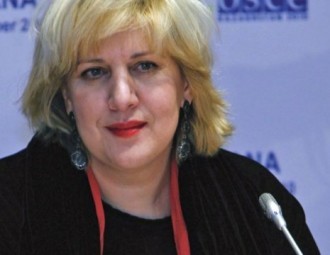Dunja Mijatović wants to discuss media freedom with Belarus Foreign and Information Ministers

OSCE Representative on Freedom of the Media is on a visit to Belarus on September 15-16.
Within the frames of her visit, the OSCE Representative on Freedom of the Media Dunja Mijatović is to meet Minister of Foreign Affairs Uladzimir Makei and Information Minister Lilia Ananich.
Meanwhile Deputy Foreign Minister Alena Kupchina made a statement, claiming that Belarus is prepared for an open dialogue with OSCE Representative on Freedom of the Media, Euroradio informs.
She is taking part in a one-day seminar held in Minsk, which was organized by the representative office of the Organization for Security and Cooperation in Europe and on the freedom of the media and the Belarusan Ministry of Foreign Affairs. It is attended by Belarusan journalists from state and non-state media, representatives of the BAJ (Belarusan Association of Journalists), the Ministry of Foreign Affairs, the Ministry of Internal Affairs, presidential Operational and Analytical Centre, international experts, as well as members of the Office of the OSCE Representative on Freedom of the Media led by Dunja Mijatović.
Belarus is ready for open, interesting and constructive dialogue with the Office of the OSCE Representative on Freedom of the Media, said Alena Kupchina. According to her, the media field in Belarus "is developing rapidly" and "it is one of the priority areas of cooperation with the OSCE." This work is done in order to build a "constructive and respectful interaction between journalists and law enforcement agencies under the law" and "create conditions for effective implementation of professional duties by both parties."
"Both sides should work together to ensure freedom of the media in Belarus, Dunja Mijatović said. There must be political will, the desire of the government. Lately, the number of arrests [of the journalists] has decreased significantly, but even if there is a single arrest - I will raise this issue."
The OSCE representative also noted that the Belarusan legislation in the media "needs improvement", and this is the direction in which the OSCE "will continue to work with the Government of Belarus," at the same time improving the safety level of journalists.
-
03.01
-
07.10
-
22.09
-
17.08
-
12.08
-
30.09








































